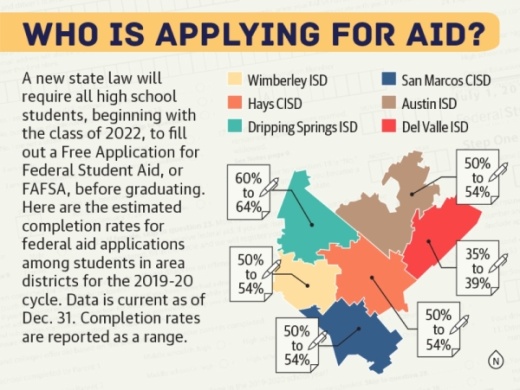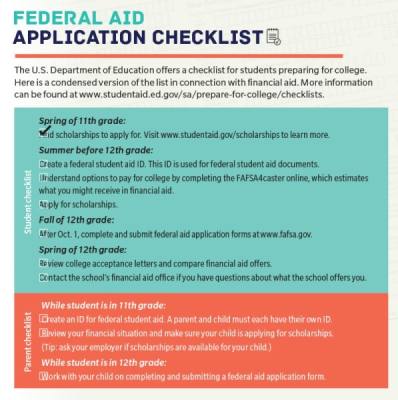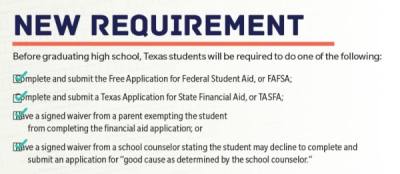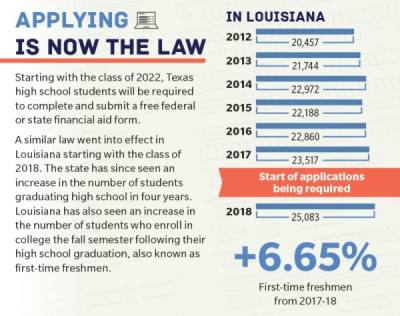The cost of college continues to increase, but too often, financial aid officials say, students fail to tap into existing resources, resulting in “money left on the table.”
A state law passed last year could help. Included in House Bill 3, which focused on school finance reform, is a requirement that all high school students fill out and submit a Free Application for Federal Student Aid, or FAFSA, prior to graduating. Current high school sophomores who graduate in 2022 will be the first to fall under the new law.
“People feel that if you complete the FAFSA, you’d be more inclined to want to go to college [and] to learn more about financial aid,” said Jerel Booker, assistant commissioner for college readiness and success with the Texas Higher Education Coordinating Board. “A lot of people feel the biggest reason ... students aren’t going is because of costs.”
Students who apply for federal aid may become eligible for grants, scholarships, loans, study-abroad aid, work-study jobs or tax benefits. Many colleges and universities also use the completed form to determine the financial aid they will be willing to provide to students.
Charlotte Winkleman, the director of guidance and counseling at Hays CISD, said she thinks the new state rules under HB 3 can help increase enrollment in higher education.
“The research is pretty clear,” Winkleman said. “If they can’t pay for it, or they think they can’t pay for it, they’re probably not even going to apply.”
Law to require applications
The Texas Education Agency mandated that students in the state fill out a federal aid application to make sure people would submit the form, Booker said. Mandating the application also allows the state to spend time, effort and money to track it.
Keeping track of a FAFSA application, Winkleman said, will be a good thing for the district. Even though HCISD already reaches out to many students about financial aid and college plans, the new law will mean the administration will have to be systematic about it.
“We have to keep track for the accountability piece,” Winkleman said. “The reason is very clear: If you don’t give [students] the opportunity to show them what’s possible then they don’t know what’s possible. So it’s really our responsibility."
Louisiana was the first state to pass a similar law, called the Financial Aid Access Policy. It first began with the state’s graduating class of 2018. Louisiana officials said they have already seen benefits.
In 2018, the number of high school graduates in Louisiana who enrolled in college hit a high of 25,083 students, according to an email from Sydni Dunn, press secretary with the Louisiana Department of Education. That number represented an increase of about 1,500 graduates from the previous year.
“We cannot definitively say these gains are a result of our Financial Aid Access Policy,” Dunn said in the email. “But we are hopeful the policy has positively influenced college enrollment and will continue to do so.”
Much like Texas, Louisiana requires all public high school students to complete and submit either a federal or state aid application. Students may also opt out with a letter, form or waiver. If students in Louisiana do not complete one of these steps, they will not graduate with a high school diploma, Dunn said in the email.
Texas high school students will also have the option of filling out the Texas Application for State Financial Aid, or TASFA, instead, which is important for those students who are undocumented or who not have social security numbers and are not eligible for federal aid.
“A lot of our parents we’ve found over the years that are undocumented are real fearful of giving any information,” Winkleman said. “So we try to calm their fears and have those conversations with the parents that [the form] just goes to the university, just for financial aid.”
High school students who choose not to apply for federal or state aid must submit a waiver signed by a parent or school counselor.
Grace Delgadillo, San Marcos CISD college and career adviser, said the district already puts a great deal of effort into making sure that students who want to fill out the FAFSA know they can have help, but that there are situations in which a family may not need or want to apply for financial aid, sometimes because students are going straight into the military or into the workforce, or because some parents are uncomfortable giving out tax information.
Delgadillo also said that while it is important to talk to students about higher education and the FAFSA process, students should also be made aware of the commitment.
“I think it’s really important to talk to students and encourage them to pursue a higher education whether its through technical community college or a four-year [degree],” Delgadillo said. “I think it’s also important while we’re telling students to apply for financial aid, to get money to go to school, that they’re also financially aware of the decisions.”
Enforcing the law
It is too early to tell exactly how the Texas Education Agency will enforce the law under HB 3 or keep track of which students do and do not complete the application. Booker said he expects Texas’ process to resemble Louisiana’s.
A Texas Education Agency advisory committee will present plans to the state Legislature about tracking and enforcing the law by January 2021.
Dunn recommends that Texas counselors offer “clear communication and strong partnerships” when it comes to implementation of this new law. Dunn said the Louisiana Department of Education created additional resources and events to help.
Winkleman said that HCISD will strongly encourage students to fill out a FAFSA form but will not try to force anyone into it.
“If the parents don’t want to do it, we’re not going to force them to do it,” Winkleman said. “We’re not going to override that family decision.”
But Winkleman added that she believes there are benefits to requiring students to fill out the FAFSA forms that go beyond just helping students think about financial aid for higher education. It also gives the district another chance to talk to high schoolers about college readiness.
“It’s given us that opportunity to have that extra conversation about: ‘What college do you want to go to?’ and ‘What are your plans?” Winkleman said. “It’s not just the financial aid application; it’s also the college application. It’s a good conversation.”
Additional reporting by Katharine Jose







